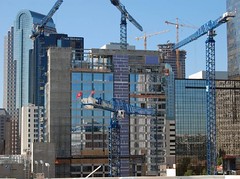The US-based hospitality major Hilton International Co is thinking of bringing more of its global brands, including luxury chains Waldorf Astoria and Conrad, to the country.

Photo by MelkirThe company is willing to expand its base in India particularly after it got into a joint venture with real estate major DLF in 2006-07, in which the American chain holds a 26% stake. At that time, the JV had announced plans to invest $ 1.5 billion to open 50-75 properties across the country over next few years. Now it is believed that the company has sought permission to either invest or acquire stake in other Indian hospitality firms as well.
According to some official sources, Hilton International Co had sought an approval from the Foreign Investment Promotion Board (FIPB) to allow it to bring forward more brands such as Doubletree and Hampton by Hilton, Waldorf Astoria and Conrad which was deferred by the FIPB in its meeting held last month.
It had sought a change in existing approval by the FIPB, under which it operates a joint venture with DLF for running four of its brands in India. The brands include the serviced apartments under the Hilton Residences and Homewood Suites and serviced segment Hilton and Hilton Garden Inn.
In its application to the FIPB, the hospitality major also sought permission to invest in or acquire equity stake in other Indian companies, which are into hospitality and tourism sectors.
“The existing JV remains on track. The new partnerships will be for its other brands that it intends to bring to the country,” the sources from the company said.
Hilton Worldwide has global revenue of over $ Eight billion and currently operates over 3,200 properties across 80 countries. It owns, manages or franchises a portfolio of over a dozen brands.
Hilton currently operates 2 hotels in Delhi. One of which is under the JV and the other under a franchise agreement with a local partner.
With so many world’s leading corporations coming to India in the year ahead the country’s economy is on a roll.



